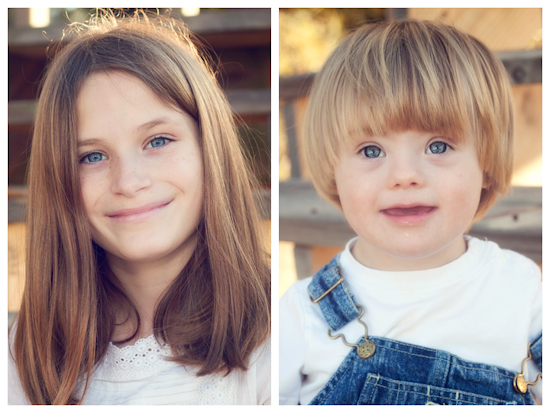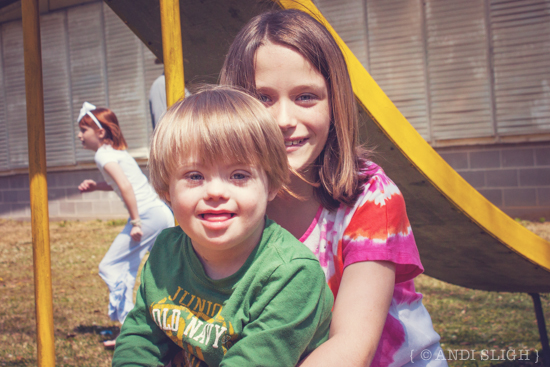April 10 is National Siblings Day, and my friend Shasta of Outrageous Fortune recruited several bloggers (including yours truly) to feature posts this week on the siblings of our special needs children…we are calling it Special Needs Sibling Week. Throughout the week you’ll see posts from some of my favorite bloggers, and if you blog about your special needs kid and want to join us in our celebration of The Other One in your household, take a minute to link up your post using the linky on Shasta’s blog.
I’ve seen it written and heard it said many times: parents worry that their typical child will suffer because they don’t get as much attention as the one with extra needs. Although it seems to be a valid concern, I can’t speak to it myself…because both of my kids have special needs.
Both of them have therapy appointments and see specialists.
Both of them need a little extra help sometimes.
Both of them stand out in a crowd because they look a little different.
Which one is The Other One? The answer is simultaneously both and neither.
Something that I marvel about again and again is that in terms of their makeup, their specific conditions, and their developmental delays, they couldn’t be more different from each other. Sarah Kate’s delays are exclusively gross motor; although cerebral palsy is caused by a problem in the brain, her case is manifested solely in her legs. Occasionally when she’s concentrating on something (like catching a softball or running), her hand will tense up and her fingers will splay – presumably because her brain has to steal a little power from one area to handle the extra load – but for the most part her challenges are limited to things like poor balance, an awkward gait, little to no jumping ability, and the like.
Not so for Nathan.
Nathan was a little slow to walk, but once he “got it” he was off to the races. Although kids with Down syndrome are often delayed in their motor skills, he isn’t. When Sarah Kate was his age, she was only sorta-kinda starting to use quad canes to walk – independent steps were few and far between, and she sobbed from fear the whole time she was taking them. She’s made lots of progress over the years, and it wasn’t very long ago that Sarah Kate would chase Nathan around the house.
But now he can outrun her.
In the weeks after Nathan was born, when we first learned of his diagnosis of Down syndrome, I wasn’t devastated, as I’ve said before, but one thing did worry me – a lot. I feared what the long term impact to Sarah Kate would be. Mr. Andi and I were both 40 years old when Nathan was born, so I had seen the statistics and done the math. Her life was already going to be a challenge – was it fair that she might also have to care for a brother who might never live independently?
Three years later, I see the way my kids learn and grow from each other and how each of their strengths plays to the other’s weaknesses.
Nathan’s rough-and-tumble-ness and ability to go-go-go encourages Sarah Kate to run and move, rather than being sedentary. Her clear articulation and chatty nature encourage him to work harder at improving his speech (though of course he doesn’t know that’s what he’s doing).
As the big sister, Sarah Kate has needed to step up and take more responsibility around the house than she may have otherwise, and she’s surprised me a few times with what she’s capable of doing. Nathan has watched enough of Sarah Kate’s softball games and practices to become interested in tee-ball, and he’s not bad for a barely-three year old. Sports can have a positive impact on him socially, so I anticipate all those hours of spectating (and now modeling) her will pay dividends for him down the line.
So I don’t think too much about the long range future anymore and I don’t worry about one having to care for the other. If the last three years have taught me nothing else, I now know that I shouldn’t look too far forward, because plans and dreams can go awry. As I’m a worrier by nature, that’s a hard lesson to accept. Both my kids have extra needs, but their strengths and weaknesses compliment each other well, and each is the typical one in his or her own way.



I know that my brother and sister sometimes feel left out but they love me. Don’t worry about Sarah Kate having to take care of Nathan I’m sure they will both be independent.